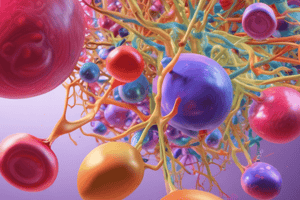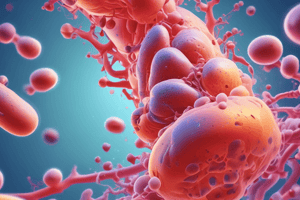Podcast
Questions and Answers
What is the mechanism of action of antiplatelets?
What is the mechanism of action of antiplatelets?
- Inhibit platelet aggregation (correct)
- Inhibit clotting factor activity
- Prevent platelet formation
- Enhance platelet activation
Which type of antiplatelet irreversibly inhibits COX-1?
Which type of antiplatelet irreversibly inhibits COX-1?
- Glycoprotein IIb/IIIa inhibitors
- P2Y12 receptor antagonists
- Aspirin (correct)
- Thienopyridines
What is the primary indication for antiplatelet therapy?
What is the primary indication for antiplatelet therapy?
- Venous thromboembolism prevention
- Atrial fibrillation
- Acute coronary syndrome (correct)
- Pulmonary embolism treatment
What is the mechanism of action of anticoagulants?
What is the mechanism of action of anticoagulants?
Which type of anticoagulant inhibits thrombin?
Which type of anticoagulant inhibits thrombin?
What is a common indication for anticoagulant therapy?
What is a common indication for anticoagulant therapy?
What is the key difference between antiplatelets and anticoagulants?
What is the key difference between antiplatelets and anticoagulants?
Which of the following is NOT a type of antiplatelet?
Which of the following is NOT a type of antiplatelet?
Flashcards are hidden until you start studying
Study Notes
Antiplatelets
- Mechanism of action: Inhibit platelet aggregation, preventing formation of thrombi
- Types:
- Aspirin: Irreversibly inhibits COX-1, reducing thromboxane A2 production
- Thienopyridines: Inhibit P2Y12 receptor, preventing ADP-mediated platelet activation (e.g., clopidogrel, prasugrel)
- Glycoprotein IIb/IIIa inhibitors: Inhibit platelet aggregation by blocking GP IIb/IIIa receptors (e.g., abciximab, eptifibatide)
- P2Y12 receptor antagonists: Reversibly inhibit P2Y12 receptor, preventing ADP-mediated platelet activation (e.g., ticagrelor, cangrelor)
- Indications:
- Acute coronary syndrome (ACS)
- Percutaneous coronary intervention (PCI)
- Stroke prevention
- Peripheral artery disease
Anticoagulants
- Mechanism of action: Inhibit clotting factor activity or prevent clot formation
- Types:
- Warfarin: Inhibits vitamin K-dependent clotting factors (II, VII, IX, X)
- Direct oral anticoagulants (DOACs):
- Direct thrombin inhibitors: Inhibit thrombin (e.g., dabigatran)
- Factor Xa inhibitors: Inhibit FXa (e.g., rivaroxaban, apixaban, edoxaban)
- Heparins: Inhibit thrombin and factor Xa (e.g., unfractionated heparin, low-molecular-weight heparins)
- Fondaparinux: Inhibits factor Xa
- Indications:
- Atrial fibrillation (AF)
- Venous thromboembolism (VTE) prevention and treatment
- Pulmonary embolism (PE) treatment
- Mechanical heart valve prophylaxis
Key Differences
- Antiplatelets: Inhibit platelet aggregation, primarily used for arterial thrombosis prevention
- Anticoagulants: Inhibit clotting factor activity, primarily used for venous thrombosis prevention and treatment
Antiplatelets
- Inhibit platelet aggregation, preventing formation of thrombi
- Aspirin: Irreversibly inhibits COX-1, reducing thromboxane A2 production
- Thienopyridines: Inhibit P2Y12 receptor, preventing ADP-mediated platelet activation
- Glycoprotein IIb/IIIa inhibitors: Inhibit platelet aggregation by blocking GP IIb/IIIa receptors
- P2Y12 receptor antagonists: Reversibly inhibit P2Y12 receptor, preventing ADP-mediated platelet activation
- Indicated for:
- Acute coronary syndrome (ACS)
- Percutaneous coronary intervention (PCI)
- Stroke prevention
- Peripheral artery disease
Anticoagulants
- Inhibit clotting factor activity or prevent clot formation
- Warfarin: Inhibits vitamin K-dependent clotting factors (II, VII, IX, X)
- Direct oral anticoagulants (DOACs):
- Direct thrombin inhibitors: Inhibit thrombin
- Factor Xa inhibitors: Inhibit FXa
- Heparins: Inhibit thrombin and factor Xa
- Fondaparinux: Inhibits factor Xa
- Indicated for:
- Atrial fibrillation (AF)
- Venous thromboembolism (VTE) prevention and treatment
- Pulmonary embolism (PE) treatment
- Mechanical heart valve prophylaxis
Key Differences
- Antiplatelets: Inhibit platelet aggregation, primarily used for arterial thrombosis prevention
- Anticoagulants: Inhibit clotting factor activity, primarily used for venous thrombosis prevention and treatment
Studying That Suits You
Use AI to generate personalized quizzes and flashcards to suit your learning preferences.




